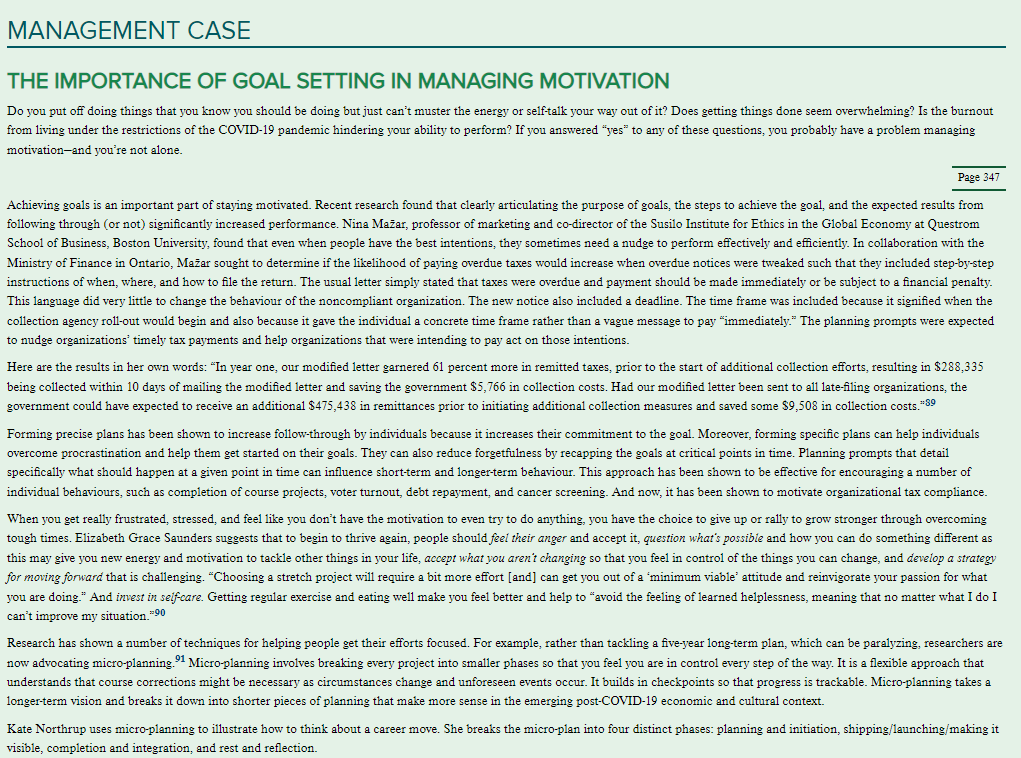
Do you put off doing things that you know you should be doing but just can't muster the energy or self-talk your way out of it? Does getting things done seem overwhelming? Is the burnout from living under the restrictions of the COVID-19 pandemic hindering your ability to perform? If you answered "yes" to any of these questions, you probably have a problem managing motivation-and you're not alone. Achieving goals is an important part of staying motivated. Recent research found that clearly articulating the purpose of goals, the steps to achieve the goal, and the expected results from following through (or not) significantly increased performance. Nina Maar, professor of marketing and co-director of the Susilo Institute for Ethics in the Global Economy at Questrom School of Business, Boston University, found that even when people have the best intentions, they sometimes need a nudge to perform effectively and efficiently. In collaboration with the Ministry of Finance in Ontario, Mazar sought to determine if the likelihood of paying overdue taxes would increase when overdue notices were tweaked such that they included step-by-step instructions of when, where, and how to file the return. The usual letter simply stated that taxes were overdue and payment should be made immediately or be subject to a financial penalty. This language did very little to change the behaviour of the noncompliant organization. The new notice also included a deadline. The time frame was included because it signified when the collection agency roll-out would begin and also because it gave the individual a concrete time frame rather than a vague message to pay "immediately." The planning prompts were expected to nudge organizations' timely tax payments and help organizations that were intending to pay act on those intentions. Here are the results in her own words: "In year one, our modified letter garnered 61 percent more in remitted taxes, prior to the start of additional collection efforts, resulting in $288,335 being collected within 10 days of mailing the modified letter and saving the government $5,766 in collection costs. Had our modified letter been sent to all late-filing organizations, the government could have expected to receive an additional $475,438 in remittances prior to initiating additional collection measures and saved some $9,508 in collection costs." 89 Forming precise plans has been shown to increase follow-through by individuals because it increases their commitment to the goal. Moreover, forming specific plans can help individuals overcome procrastination and help them get started on their goals. They can also reduce forgetfulness by recapping the goals at critical points in time. Planning prompts that detail specifically what should happen at a given point in time can influence short-term and longer-term behaviour. This approach has been shown to be effective for encouraging a number of individual behaviours, such as completion of course projects, voter turnout, debt repayment, and cancer screening. And now, it has been shown to motivate organizational tax compliance. When you get really frustrated, stressed, and feel like you don't have the motivation to even try to do anything, you have the choice to give up or rally to grow stronger through overcoming tough times. Elizabeth Grace Saunders suggests that to begin to thrive again, people should feel their anger and accept it, question what's possible and how you can do something different as this may give you new energy and motivation to tackle other things in your life, accept what you aren't changing so that you feel in control of the things you can change, and develop a strategy for moving forward that is challenging. "Choosing a stretch project will require a bit more effort [and] can get you out of a 'minimum viable' attitude and reinvigorate your passion for what you are doing." And invest in self-care. Getting regular exercise and eating well make you feel better and help to "avoid the feeling of learned helplessness, meaning that no matter what I do I can't improve my situation. 290 Research has shown a number of techniques for helping people get their efforts focused. For example, rather than tackling a five-year long-term plan, which can be paralyzing, researchers are now advocating micro-planning. 91 Micro-planning involves breaking every project into smaller phases so that you feel you are in control every step of the way. It is a flexible approach that understands that course corrections might be necessary as circumstances change and unforeseen events occur. It builds in checkpoints so that progress is trackable. Micro-planning takes a longer-term vision and breaks it down into shorter pieces of planning that make more sense in the emerging post-COVID-19 economic and cultural context. Kate Northrup uses micro-planning to illustrate how to think about a career move. She breaks the micro-plan into four distinct phases: planning and initiation, shipping/launching/making it visible, completion and integration, and rest and reflection







